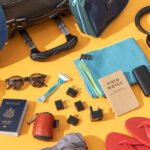Traveling for the first time is an exciting experience! It opens doors to new cultures, breathtaking sights and unforgettable adventures. But along with the thrill comes the need to be mindful of safety, especially if you are unfamiliar with your destination. If you are preparing for your first trip, here are some practical safety tips to make sure your trip goes as smoothly and pleasantly as possible.
1. Do some thorough research on your destination
Before you travel anywhere, take some time to research your destination. Familiarize yourself with local customs, the best ways to get around and potential safety concerns. Research popular tourist areas, which neighborhoods to avoid and which scams commonly target tourists. Websites like TripAdvisor and government travel advisories offer reliable information to help you prepare.
Important tip: Print or save important addresses such as your hotel, embassy and emergency contacts in case you don’t have internet access.

2. Share your itinerary with family or friends
It’s always a good idea to let someone you trust know about your travel plans. Share your itinerary, flight details and hotel information with a family member or friend. Check in with them occasionally to let them know you’re safe. That way, if an emergency occurs, they’ll know where you are and how to reach you.
Important tip: Update your emergency contact if you change plans during your trip.
3. Pack light and smart
Packing light will keep you more mobile and less of a target for thieves. Avoid flashy jewelry or expensive electronics that might attract attention. Pack only the essentials and try to take things that won’t stand out. It’s also important to keep your belongings safe; use a shoulder bag with zippers and consider investing in an anti-theft backpack for extra security.
Important tip: Always keep a copy of your important documents (passport, ID, tickets) in digital and physical form in case of loss or theft.
4. Be aware of your surroundings
Being aware is key to staying safe, especially in unfamiliar places. Avoid looking too much like a tourist by walking confidently, avoiding large maps in public and keeping your phone use to a minimum while out and about. Be cautious of people getting too close to you, especially in crowded areas, as this could be a tactic used by pickpockets.
Important tip: If you ever feel uncomfortable or unsafe, trust your instincts. Go to a more populated area or find a safe place like a cafe or shop to regroup.

5. Use reliable transportation
Using public transportation or local taxis is often convenient, but it’s important to choose safe options. Research the best ways to get around your destination – some places may have reliable buses, while others may prefer ride-sharing apps like Uber. If you take a taxi, look for official, licensed taxis and avoid unmarked vehicles. In some places, renting a car may be the safest option, especially for exploring remote areas.
Important tip: Research transportation routes and fares before you travel to avoid confusion and reduce the risk of being overcharged.
6. Stay connected with a local SIM card or portable Wi-Fi
A reliable phone connection can be a lifesaver. It allows you to access maps, make calls, and contact people in an emergency. Consider purchasing a local SIM card or portable Wi-Fi device if your phone plan doesn’t cover international destinations. This is especially helpful for exploring new places and checking public transit schedules.
Important tip: Download offline maps and translation apps in case you lose internet access while exploring.
7. Secure your money and valuables
When it comes to money, carry a combination of cash and cards, but avoid taking all your valuables at once. Leave extra cash, cards, and your passport in a safe place in your accommodation, such as a safe. Carry only the cash you need for the day, and keep it in separate bags so you don’t lose everything if you get robbed.
Important tip: Consider a money belt or concealed pouch for extra security, especially in crowded tourist areas.
8. Avoid risky behavior
It can be tempting to let loose and try adventurous activities when traveling, but safety should always come first. Avoid excessive alcohol or drug use, as these can impair your judgment and leave you vulnerable. Stick to activities with reputable companies, especially if you’re trying something risky like scuba diving, rock climbing, or parasailing.
Important tip: Read reviews of tour companies online to make sure they follow safety protocols and have a good reputation.

9. Stay healthy by being mindful of what you eat and drink
Eating is an important part of traveling, but it’s wise to be cautious. Avoid street food in places where hygiene might be an issue, and only drink bottled or filtered water if the tap water isn’t safe. Familiarize yourself with general food safety tips, especially in countries with unfamiliar cuisine.
Important tip: Pack some basic medications like painkillers, antihistamines, and anti-nausea tablets to be prepared for minor health issues.
10. Trust your instincts and stay confident
And finally, trust your instincts. If something feels off, it probably is. Avoid situations that make you feel uncomfortable, and don’t be afraid to say no or walk away if you see someone suspicious. A confident attitude can also deter potential scammers or criminals.
Important tip: Always have a backup plan in mind and be aware of emergency exits and contact numbers no matter where you go.
Final thoughts
Your first trip is a huge milestone, and if you take care of your safety, you’ll have nothing but positive memories of it. By planning ahead, staying alert, and taking a few simple precautions, you’ll be prepared for almost anything you encounter. Embrace the adventure, be careful and most importantly, enjoy every moment of your journey! Have a nice trip!




No Comment! Be the first one.